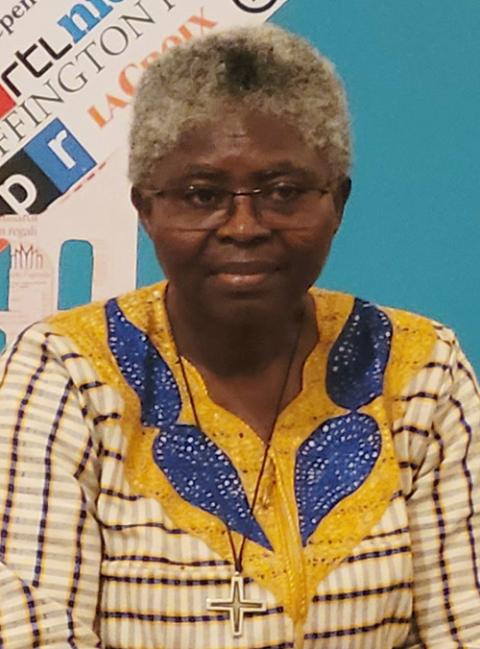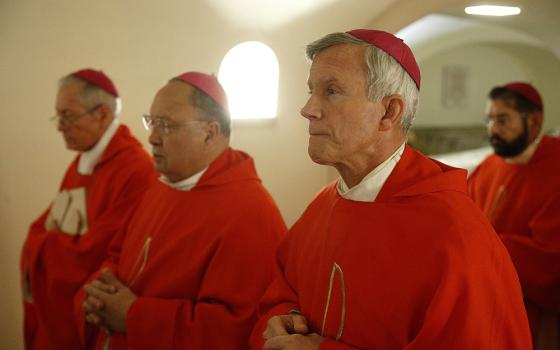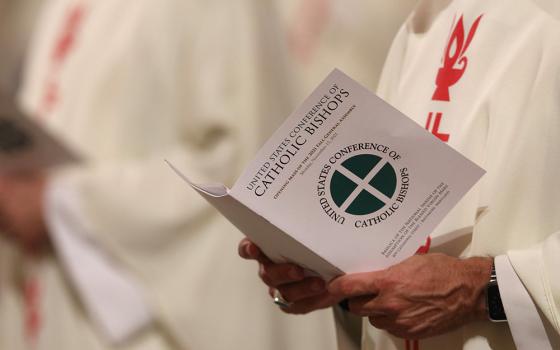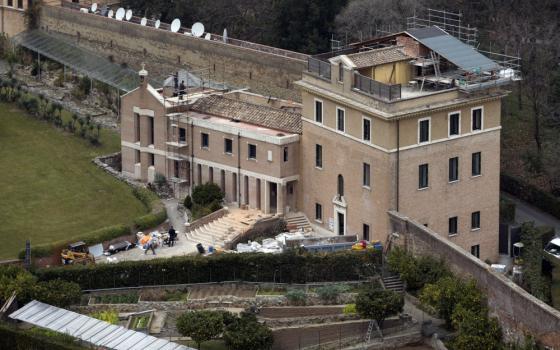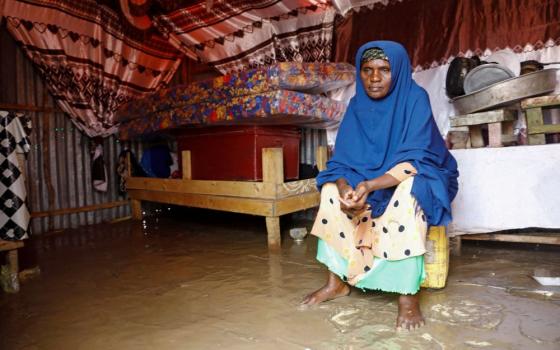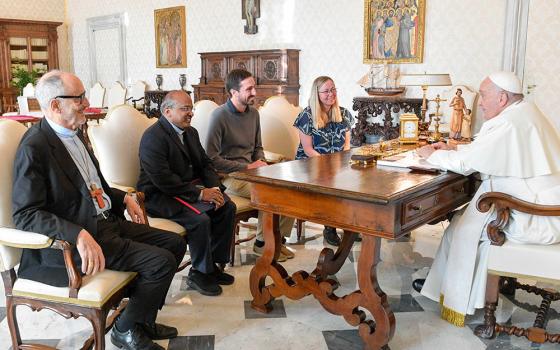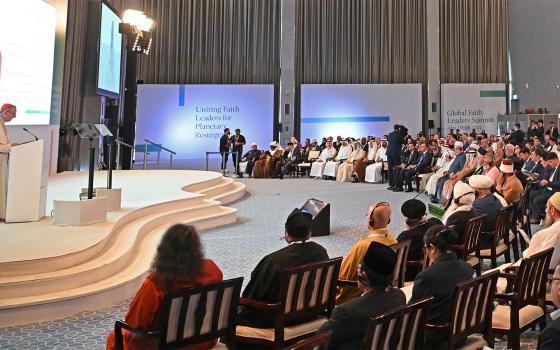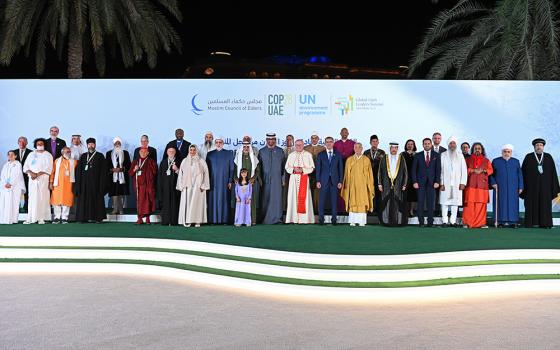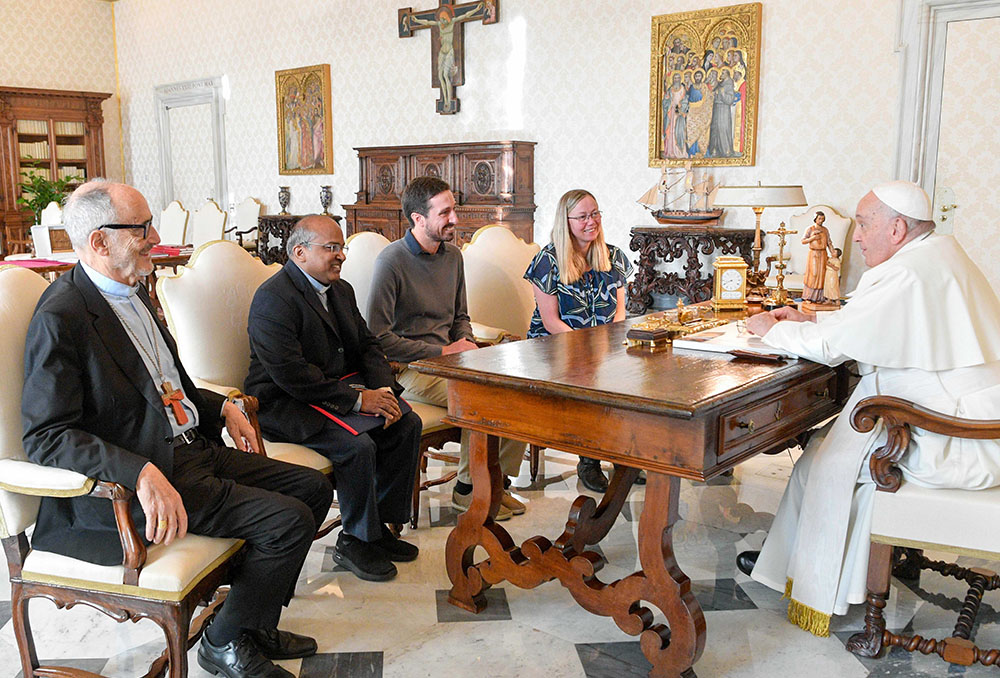
Pope Francis meets with leaders of the Laudato Si’ Movement in the library of the Apostolic Palace at the Vatican Nov. 6. From left to right: Cardinal Michael Czerny, prefect of the Dicastery for Promoting Integral Human Development; Jesuit Fr. Xavier Jeyaraj; Tomás Insua; and Lorna Gold. (CNS/Vatican Media)
Pope Francis' trip next month to the United Nations climate summit will be a significant moment, say Catholics and environmental officials. The event, they say, will provide him an opportunity to raise his powerful moral voice at a pivotal time when planet-heating emissions continue to rise.
But they say that what the pope says, or the Vatican does, could determine whether his presence serves as a spark to redouble actions to limit climate impacts, or as a distraction for fraught negotiations that face increasing questions of credibility.
In early November, the pope announced his plans to attend COP28, the 28th meeting of the U.N. climate change conference, which will be held Nov. 30-Dec. 12 this year in Dubai, United Arab Emirates. He will be the first pope to ever take part in the international climate summit in its nearly 30-year history. His visit comes a year after the Holy See formally became a party to the U.N. Framework Convention on Climate Change.
'The church is not just there to pray. No, the church is there to make sure that society is a livable place for all creatures — humans and nature.'
—Sr. Maamalifar Poreku
Per a schedule from the Vatican, the pope's three-day trip will include a Dec. 2 address during the high-level summit at the start of COP28. Francis will also take part in private bilateral meetings and help inaugurate the first-ever Faith Pavilion at a U.N. climate summit.
"The pope is hard to ignore, and the fact he'll speak at the start of the summit will hopefully set the tone for the rest of the negotiations," said Lorna Gold, board president of the Laudato Si' Movement, a network of nearly 900 Catholic institutions working on climate action and ecospirituality.
Alistar Dutton, secretary general of Caritas Internationalis, the international confederation of Catholic humanitarian and development organizations, called the pope's upcoming visit "a crucial moment" for the church to stand with those facing the impacts of climate change and to reinforce to countries their shared duty under the 2015 Paris Agreement to slash emissions to minimize catastrophic impacts of climate change upon people and ecosystems.
"It's more than a gesture; it's a call to action," he said in an email.
"For me, this is very significant for the church," said Sr. Maamalifar Poreku, co-executive secretary for Justice, Peace and Integrity of Creation for the International Union of Superiors General, the umbrella group of women religious congregations. "The church is not just there to pray. No, the church is there to make sure that society is a livable place for all creatures — humans and nature."
Iyad Abumoghli, founder and director of the U.N. Environment Programme's Faith for Earth coalition, said the pope's presence at COP28, as well as his support for a recent interfaith statement for climate action, "exemplifies the pivotal role faith leaders play" in steering the world toward environmental responsibility, and "underlines that the urgency of climate change is not only a matter of policy but a profound moral imperative."
Bill McKibben, the longtime environmental writer and founder of grassroots climate groups 350.org and Third Act, in an email to EarthBeat called the pope's presence at COP28 "a powerful sign."
Advertisement
"Along with Greta Thunberg and a very few others, he's become the planet's conscience on the climate crisis," McKibben said. "It should inject a note of physical and moral reality into the highly contrived greenwashing that usually dominates these talks."
Already, COP28 has faced low expectations and credibility questions. The host country, UAE, has plans to expand production of its deep oil deposits. COP28 president-designate Sultan al-Jaber is head of the Abu Dhabi National Oil Company (though he also helped establish the International Renewable Energy Agency) and has avoided calls for a full phaseout of fossil fuels, whose burning is the primary driver of climate change.
While numerous reports have stated that nations can still avert the more devastating climate impacts expected with surpassing 1.5 C of warming, it would take substantial action this decade, including no new fossil fuel development and for global emissions to peak soon. The planet has heated an average 1.1 to 1.2 degrees Celsius since the late 1800s, and is expected to eclipse 1.5 C in the 2030s.
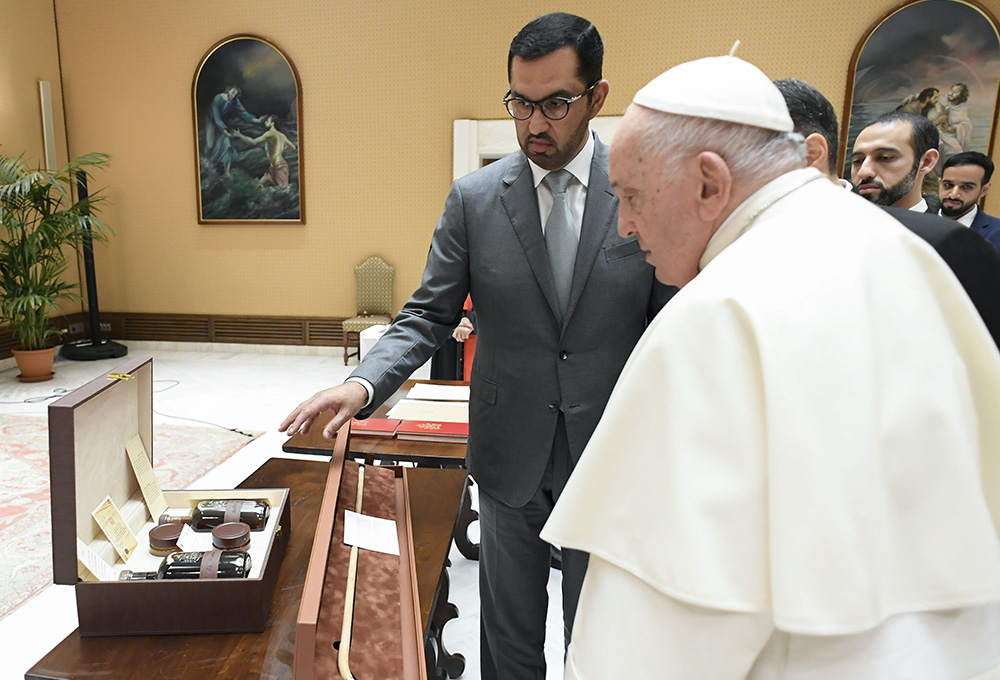
Pope Francis receives a gift from Sultan al-Jaber, the president-designate of the 2023 United Nations Climate Change Conference, known as COP28, during a meeting at the Vatican Oct. 11. (CNS/Vatican Media)
The opening segment of COP28, called the world climate action summit, is where Francis will join other heads of state in addressing the conference and its expected 70,000 attendees of negotiators, climate activists, civil society actors and industry lobbyists. Presidents and prime ministers often use this time to call attention to negotiating priorities or announce new actions and investments to curtail greenhouse gas emissions.
Many expect the pope to repeat parts of his recent apostolic exhortation, Laudate Deum, which he focused entirely "on the climate crisis." The text expands on calls to action he made in his 2015 encyclical, "Laudato Si', on Care for Our Common Home."
Gold told EarthBeat that Francis' presence at the COP shows the "absolute seriousness" of the situation facing the planet, with temperatures continuing to rise and countries collectively well behind pace in meeting climate goals — a reality that will be highlighted in Dubai during the "global stocktake" to assess progress on implementing the Paris accord.
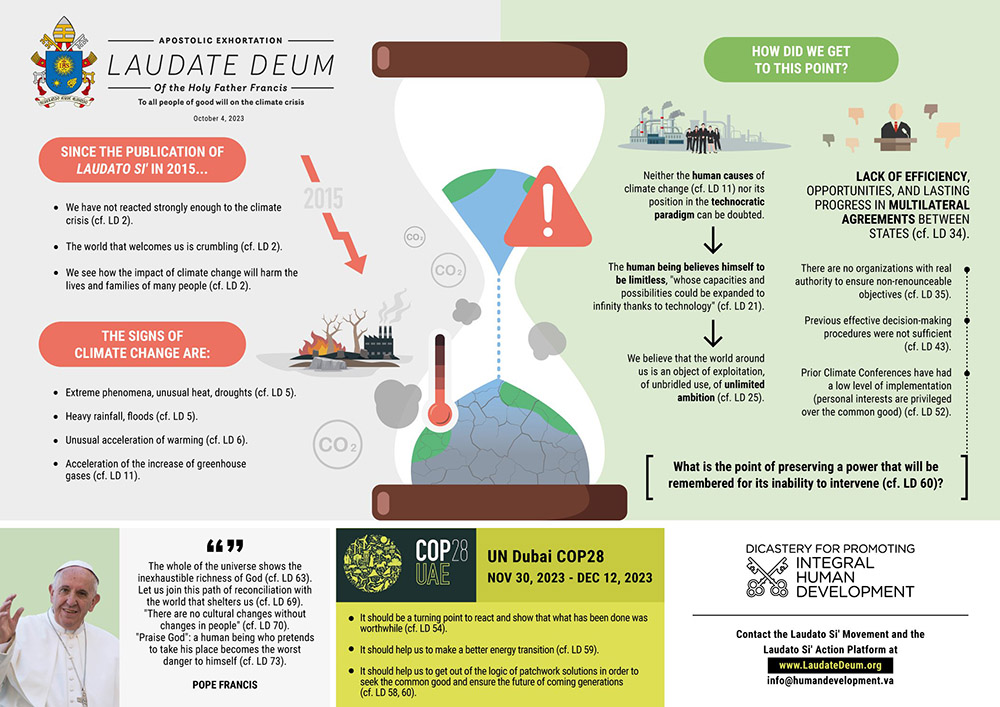
The Vatican's Dicastery for Promoting Integral Human Development published this infographic Oct. 4, marking the release of Pope Francis' document on the climate crisis, Laudate Deum. (CNS/Dicastery for Promoting Integral Human Development)
The pope demonstrates in Laudate Deum "a good reading" of the precarious place the world stands on climate change, Manuel Vidal-Pulgar, a former environment minister of Peru and president of COP20 in Lima, told EarthBeat.
A Catholic, Vidal-Pulgar said he expects Francis could play a role in reinforcing the conclusions of the stocktake and the urgent need for a course correction, including a call that national climate pledges — with the next updates due in 2025 — be mandatory rather than voluntary.
"I am pretty sure that we will listen more than once in different rooms, in different events [to] many people, even parties, using some phrase of the pope as a way to encourage that decision," he said.
Gold, who was part of a Laudato Si' Movement contingent that met with Francis this month, will be at COP28. She expressed hope that the pope with his speech can give negotiators "a moral focus and set the tone for the whole summit."
Catholics engaged in the climate talks say it should include calls for deep reductions in emissions, rather than "false solution" methods like carbon capture and sequestration, as well as substantially increased financial support through funding for adaptation and loss and damage from the impacts of climate change alongside mitigation.
They also expressed hope he will highlight the serious impacts that stronger storms and more severe droughts and flooding have on people, including those forced to leave their homes.
Poreku, a Missionary Sister of Our Lady of Africa, added she hopes that hearing the calls for action in Laudate Deum directly from the pope, rather than reading it off a page, can turn the hearts of heads of state and their negotiating teams to take concrete measures to quickly and substantially curb emissions and move beyond the "talking and talking and talking" without actions that has permeated COPs for years.
"They don't feel the pinch of what ordinary people, especially those on the margins, are experiencing because of this climate change. … But Pope Francis feels the pinch of those who are suffering this. And that's why every day he talks about it," she told EarthBeat.
While an impactful speech may be remembered, to really turn the tide in negotiations and overcome the intransigence of countries' positions will require the pope and the Holy See to put forward "deliverables," or concrete action plans, said Griffin Thompson, a former climate negotiator for the United States under the Obama administration and an adjunct professor at Loyola University Chicago.
Pope Francis 'needs to be the voice of those at the peripheries. He needs to bring the cry of the Earth and the cry of the poor to COP.'
—Lindlyn Moma
Thompson, who has been serving as a climate expert for the Holy See, said it was rare for heads of state to attend the high-level U.N. climate conferences without plans to announce a range of deliverables.
"In the absence of the Holy Father announcing a major Vatican contribution to our collective climate change response, his appearance in Dubai could be viewed and used by many parties as purely ornamental. At worst, certain parties could use his attendance to distract from and cover up glaring deficiencies in the negotiations," Thompson told EarthBeat.
"If he is traveling to Dubai only to repeat the sentiments of Laudate Deum, it will be a squandered visit," Thompson said.
Lindlyn Moma, director of advocacy for Laudato Si' Movement who will be in Dubai, said she hoped the pope will announce a new climate plan, or nationally determined contribution, for the Holy See. In 2020, Francis committed the Vatican City State to reach net-zero emissions by 2050.
Putting forward a more ambitious climate pledge, she said, would demonstrate not only "the critical nature of the need for all the world to not just endorse a fossil fuel transition, but actually take up steps to do that. So that's what we're expecting from the Holy See."
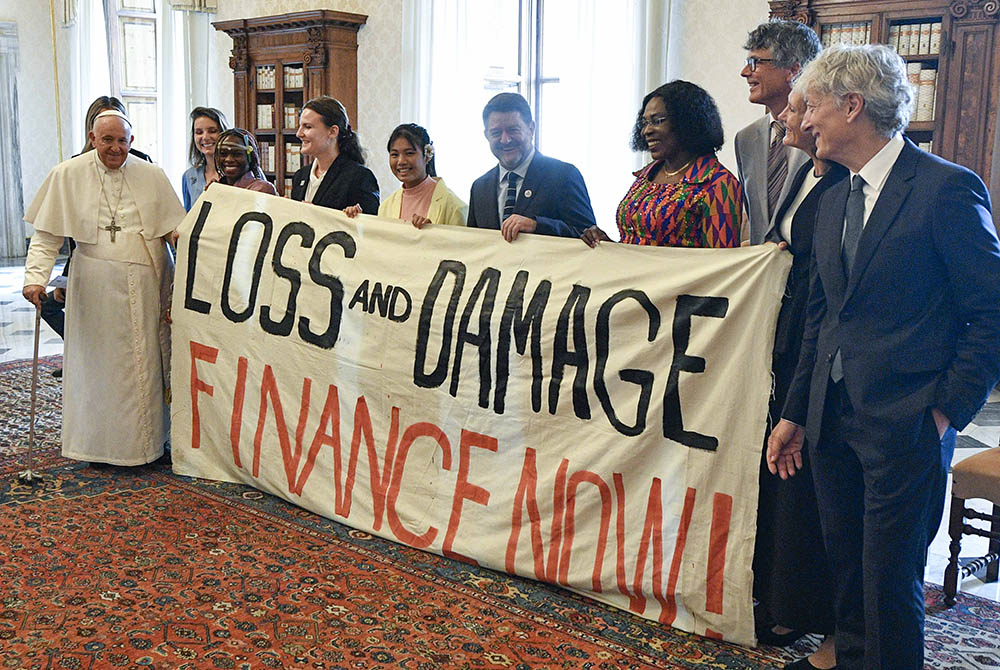
Pope Francis joins others in holding a banner during an audience at the Vatican June 5 with the organizers of the Green & Blue Festival. The banner calls for financing a "loss and damage" fund that was agreed upon at the COP27 U.N. climate conference in 2022. The fund would seek to provide financial assistance to nations most vulnerable and impacted by the effects of climate change. (CNS/Vatican Media)
Beyond his speech, Catholics working on climate expressed a desire that the pope meet with a variety of constituents on the sidelines, whether oil companies and oil-producing countries, or island states and other climate vulnerable nations, or civil society groups and the faith community. More than 60 events are planned at the Faith Pavilion throughout the conference's two weeks.
"[The pope] needs to be the voice of the voiceless. He needs to be the voice of those at the peripheries. He needs to bring the cry of the Earth and the cry of the poor to COP," Moma said.
In 2015, Francis' decision to release Laudato Si' ahead of COP21 in Paris was credited with adding momentum to an eventual deal, the first-ever where all nations committed to reducing their national greenhouse gas emissions. With progress on the Paris accord stalling, Catholics hope this first-ever papal visit can be the push international climate talks need to get back on track.
"Now, more than ever," said Rodne Galicha, executive director of Living Laudato Si' Philippines, "we need moral force to address climate emergency."
"Our faith must move us to take urgent actions, and the presence of Pope Francis is a strong voice in the negotiations wilderness, which will definitely be an echo of conscience in the halls of COP28."


